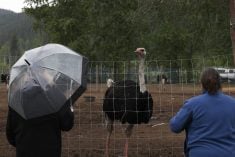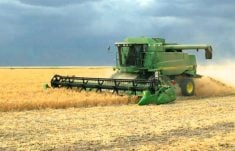By Karen Briere
Regina Bureau
Saskatchewan agriculture minister Lyle Stewart says he is disappointed with the federal grain transportation legislation unveiled Wednesday.
Suggestions from the province as to what the legislation could and should include were ignored, and Stewart said he believes the problem occurred in the federal transport department.
He told reporters that he and his federal counterpart Gerry Ritz, along with the Saskatchewan Conservative caucus, were on the same page in terms of what should be done to move grain more quickly and efficiently.
Read Also

Corteva to split seeds, pesticide units into separate listed companies
Corteva said on Wednesday it would separate its seed and pesticide businesses into separate listed companies, as the agrichemicals firm seeks to sharpen its strategic focus.
“At Transport Canada things went off the rails,” he said. “Minister (Lisa) Raitt apparently was not (on the same page).”
The Fair Rail for Grain Farmers Act maintains fines of $100,000 per day if railways don’t move a minimum 500,000 tonnes of grain per week. It will allow the Canadian Grain Commission to regulate compensation paid by grain companies to farmers if contract delivery dates are not honoured.
Stewart said the numbers put forward by the province — 13,000 cars a week and fines of $250,000 per day for non-compliance — came from industry. He said the railways should have been able to move that much grain without hurting other commodities flowing from western Canada.
“We believe that there should have been reciprocal penalties agreed to between the grain companies and the railways so they could compensate each other when they cause losses,” he said. “None of those things are in the legislation.
“At first blush, on the face of it, the legislation itself is deficient.”
The move to increase interswitching distance from 30 kilometres to 160 is helpful but only fine-tuning, Stewart added.
He said the province will not give up on getting what it wants.
“We will be making submissions and being as aggressive as we possibly can to see that those things are done,” he said.
Meanwhile, CN called the new act heavy-handed.















